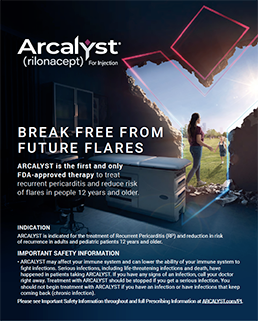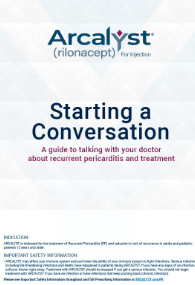Want the
latest news
and information delivered to your inbox?
QUICK RESOURCES
Important Safety Information
- ARCALYST may affect your immune system and can lower the ability of your immune system to fight infections. Serious infections, including life-threatening infections and death, have happened in patients taking ARCALYST. If you have any signs of an infection, call your doctor right away. Treatment with ARCALYST should be stopped if you get a serious infection. You should not begin treatment with ARCALYST if you have an infection or have infections that keep coming back (chronic infection).
- While taking ARCALYST, do not take other medicines that block interleukin-1, such as Kineret® (anakinra), or medicines that block tumor necrosis factor, such as Enbrel® (etanercept), Humira® (adalimumab), or Remicade® (infliximab), as this may increase your risk of getting a serious infection.
- Talk with your doctor about your vaccine history. Ask your doctor whether you should receive any vaccines before you begin treatment with ARCALYST.
- Medicines that affect the immune system may increase the risk of getting cancer.
- Stop taking ARCALYST and call your doctor or get emergency care right away if you have any symptoms of an allergic reaction.
- Your doctor will do blood tests to check for changes in your blood cholesterol and triglycerides.
- Common side effects include injection-site reactions (which may include pain, redness, swelling, itching, bruising, lumps, inflammation, skin rash, blisters, warmth, and bleeding at the injection site), upper respiratory tract infections, joint and muscle aches, rash, ear infection, sore throat, and runny nose.
For more information about ARCALYST, speak with your doctor and see the full Prescribing Information.
INDICATION
ARCALYST® (rilonacept) is an interleukin-1 blocker indicated for:
- Treatment of Recurrent Pericarditis (RP) and reduction in risk of recurrence in adults and pediatric patients 12 years and older.
- Treatment of Cryopyrin-Associated Periodic Syndromes (CAPS), including Familial Cold Auto-inflammatory Syndrome (FCAS), and Muckle-Wells Syndrome (MWS) in adults and children 12 years and older.
- Maintenance of remission of Deficiency of Interleukin-1 Receptor Antagonist (DIRA) in adults and pediatric patients weighing 10 kg or more.
Expand



